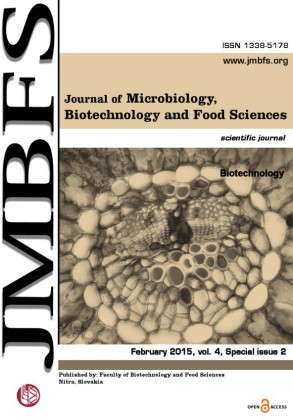EFFECT OF NATURAL PLANT EXTRACTS ON PORCINE OVARIAN FUNCTIONS
DOI:
https://doi.org/10.15414/jmbfs.2015.4.special2.45-48Keywords:
Natural plant, proliferation, apoptosis, hormone secretion, ovarian cellsAbstract
This report provides information about the impact of chosen natural plant extracts on basic ovarian functions. This article summarizes our results concerning the effect of selected plant extracts on proliferation, apoptosis and hormone secretion – release of progesterone (P4), testosterone (T) and leptin (L) on porcine granulosa cells (GC), We analyzed effects of ginkgo (GB), rooibos (RB), flaxseed (FL), green tea polyphenols (GTPP), green tea - epigallocatechin-3-gallate (EGCG), resveratrol (RSV) and curcumin (CURC) (0; 1; 10 and 100 μg.ml-1) on markers of proliferation, apoptosis and secretory activity of porcine ovarian granulosa cells by using immunocytochemistry and EIA. It was demonstrated, that all these natural plants and plant molecules inhibited the accumulation of proliferation-related peptide (PCNA) and apoptosis-associated peptide (Bax) in cultured. Furthermore, it was observed that natural plant extracts altered progesterone, testosterone and leptin release in porcine ovarian cells. It is concluded, that GB, RB, FL, RSV, CURC, GTPP and EGCG can directly affect ovarian cells and therefore they could potentially influence ovarian functions.Downloads
Download data is not yet available.
Downloads
Published
2015-02-02
How to Cite
Kádasi, A., Å tochmaľová, A., Maruniaková, N., Kolesárová, A., Grossman, R., & V. Sirotkin, A. (2015). EFFECT OF NATURAL PLANT EXTRACTS ON PORCINE OVARIAN FUNCTIONS. Journal of Microbiology, Biotechnology and Food Sciences, 4(special issue 2 (Biotechnology), 45–48. https://doi.org/10.15414/jmbfs.2015.4.special2.45-48
Issue
Section
Biotechnology
License
Copyright (c) 2015 Attila Kádasi, Aneta Štochmaľová, Nora Maruniaková, Adriana Kolesárová, Roland Grossman, Alexander V. Sirotkin

This work is licensed under a Creative Commons Attribution 4.0 International License.
All papers published in the Journal of Microbiology, Biotechnology and Food Sciences are published under a CC-BY licence (CC-BY 4.0). Published materials can be shared (copy and redistribute the material in any medium or format) and adapted (remix, transform, and build upon the material for any purpose, even commercially) with specifying the author(s).





